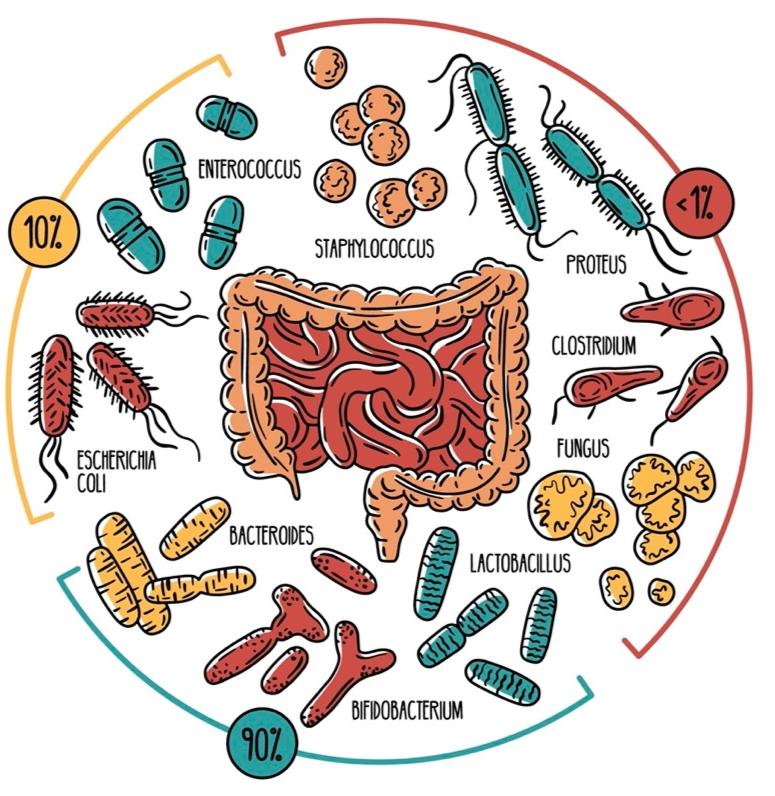In the last ten years, significant breakthroughs have uncovered the complex link between medications and gut microbiome. Our gut microbiome functions as a complex ecosystem comprising trillions of microorganisms, playing critical roles in gastrointestinal homeostasis. These microorganisms, including bacteria, archaea, viruses, and fungi, collectively contribute to various metabolic processes, nutrient absorption, and immune system modulation.
Recognizing the complex connections between the gut microbiome and overall health is paramount for informed healthcare
decisions.
HOW DO DRUGS AFFECT THE HUMAN GUT MICROBIOME?
Many individuals, often with the best intentions, resort to medications without realizing the significant impact these agents can have on the delicate balance of the gut microbiome.
Antibiotic Effect on Gut Microbiome
While antibiotics are designed to target and eliminate harmful bacteria causing infections, they can also affect beneficial bacteria essential for maintaining a healthy gut. This disturbance can lead to a reduction in microbial diversity and the overgrowth of opportunistic or resistant strains. Such alterations in the gut microbiome have been associated with various consequences, including increased susceptibility to infections, compromised immune function, and potential links to certain chronic conditions. Furthermore, antibiotic-induced changes in the gut microbiota may contribute to antibiotic-associated side effects, such as gastrointestinal issues. Recognizing the broad-reaching effects of antibiotics on the gut microbiome emphasizes the importance of judicious antibiotic use, considering both the short-term benefits of treating infections and the potential long-term consequences on overall gut health.
PPI Effect on Gut Microbiomell
The medications used for chronic conditions, such as proton pump inhibitors (PPIs) for acid reflux, have been implicated in long-term alterations to the gut microbiome.
PPIs reduce the production of stomach acid, creating an environment that fosters the overgrowth of certain bacteria, modifying the host microbiota in various segments of the gastrointestinal tract. It potentially contributes to dysbiosis and the development of gastrointestinal complications that may impact our overall health.
Antacids Effect on Gut Microbiome
Even apparently innocuous over-the-counter antacids can influence our gut microbiome. These medications are designed to alleviate heartburn and acid reflux, altering the acidity levels in the stomach, and creating an environment that may not be conducive to the survival of certain beneficial bacteria. This disturbance in the gut ecosystem may contribute to an increased susceptibility to gastrointestinal issues.
NSAIDs Effect on Gut Microbiome
Nonsteroidal anti-inflammatory drugs (NSAIDs), commonly used for mild to moderate pain or chronic conditions like rheumatoid arthritis have been associated with changes in the gut microbiota composition. So that's why taking NSAIDs for mild aches and pains that could be managed without medication or long-term use without monitoring should be discouraged.
Ibuprofen, found in Advil, is a widely recognized name in self-medication and has also been linked to changes in the gut microbiota, impacting the delicate equilibrium of beneficial bacteria.
Research has demonstrated that Acetaminophen, the key component in Tylenol, can disturb the balance of gut bacteria, affecting both their abundance and diversity. This disruption in the gut microbiome has been associated with potential consequences for immune function, which may compromise the body's ability to effectively defend against infections.
These alterations may contribute to the development or exacerbation of gastrointestinal issues in individuals reliant on these medications for chronic pain management.
CONCLUSION
We need to recognize the impact of medications on the gut microbial community and adopt a holistic approach to health, ensuring a better understanding of how pharmaceutical interventions may affect the delicate ecosystem within our body.
Disturbances within the microbial community can impact different facets of overall well-being, stressing the need for a thorough perception of its role in maintaining homeostasis.
References
1. Vich Vila, A., Collij, V., Sanna, S. et al. Impact of commonly used drugs on the composition and metabolic function of the gut microbiota. Nat Commun 11, 362 (2020). https://doi.org/10.1038/s41467-019-14177-z
2. Maseda D, Ricciotti E. NSAID-Gut Microbiota Interactions. Front Pharmacol. 2020 Aug 7;11:1153. doi: 10.3389/fphar.2020.01153. PMID: 32848762; PMCID: PMC7426480.
3. Patangia DV, Anthony Ryan C, Dempsey E, Paul Ross R, Stanton C. Impact of antibiotics on the human microbiome and consequences for host health. Microbiologyopen. 2022 Feb;11(1):e1260. doi: 10.1002/mbo3.1260. PMID: 35212478; PMCID: PMC8756738.
4. Lin YT, Lin TY, Hung SC, Liu PY, Wu PH, Chuang YS, Hung WC, Chiu YW, Kuo MC, Wu CY. Anti-Acid Drug Treatment Induces Changes in the Gut Microbiome Composition of Hemodialysis Patients. Microorganisms. 2021 Jan 30;9(2):286. doi: 10.3390/microorganisms9020286. PMID: 33573326; PMCID: PMC7910989.
5. Takagi T, Naito Y, Inoue R, Kashiwagi S, Uchiyama K, Mizushima K, Tsuchiya S, Okayama T, Dohi O, Yoshida N, Kamada K, Ishikawa
T, Handa O, Konishi H, Okuda K, Tsujimoto Y, Ohnogi H, Itoh Y. The influence of long-term use of proton pump inhibitors on the gut microbiota: an age-sex-matched case-control study. J Clin Biochem Nutr. 2018 Jan;62(1):100-105. doi: 10.3164/jcbn.17-78. Epub 2017 Dec 12. PMID: 29371761; PMCID: PMC5773837.

